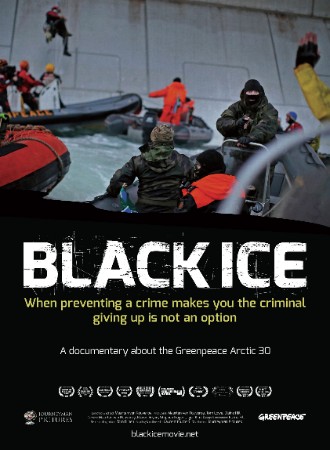
Black Ice: A Documentary about the Arctic 30 2014
Distributed by Alexander Street Press, 350 7th Ave/Ste 1100, New York, NY 10001
Produced by Maarten van Rouveroy
Directed by Maarten van Rouveroy
DVD , color, 53 min.
General Adult
Arctic, Offshore Oil Drilling, Greenpeace, Russia, Vladimir Putin, Environmental Justice
Date Entered: 11/14/2014
Reviewed by Andrew Jenks, California State University, Long BeachIn August 2013 the Greenpeace ship Arctic Sunrise entered international Arctic waters to protest Russian oil drilling. Despite warnings to turn away, ship members persisted in their attempts to storm the oil drilling rig, hoping thereby to stop oil production, and eventually provoking the Russian authorities to detain the ship and arrest crewmembers. Greenpeace media handlers immediately dubbed their arrested brethren the Arctic 30 and began a global campaign to free them. The Russian authorities had taken the bait, providing them with a tale of persecution by the authoritarian Putin government that would mobilize public opinion in favor of Greenpeace’s ecological agenda and highlight the possibility of massive environmental disaster in the Arctic should drilling continue. The film documents the dramatic encounter and arrests of the crewmembers with charges of piracy – a first for peaceful Greenpeace activists operating in international waters – though the amnesty and release of the Arctic 30 makes the hyperbolic claims of the detainees (after their release) of their brutal life in Russian prisons less convincing. Indeed, they seemed to have come out none the worse for wear after being detained, adding another encounter with Big Russian Oil to their growing resume of environmental-defense actions.
The film is framed in the context of global warming, opening with dramatic scenes of the epic floods and storms caused by climate change. But for energy companies global warming has been a blessing, creating unprecedented opportunities, due to the rapid disappearance of Arctic ice, to set up operations in the oil-rich Arctic, which the Putin government in 2007 famously declared its domain by placing a Russian flag on the North Pole ocean floor.
In the Arctic, as elsewhere, Greenpeace ships have become a thorn in the side of fishing and drilling operations at sea. Its activists had been pestering the Russian oil company Gazprom since 2012 – hoping to provoke Russian government officials, as Civil Rights activists did with racist southerners in the 1960s, into publicly recorded acts of persecution that would galvanize public opinion in favor of the environment.
The film places the Russian officials into the role of villain and convenient foil, heartlessly and destructively tapping the windfall of global warming and providing cover for global oil companies to exploit Arctic oil without having to abide by higher safety standards outside of Russia. Putin is a menacing presence throughout, a dark prince masterminding the arrest as part of his larger goal of consolidating power, making money for his oil-buddy cronies, smashing democracy, and scaring NGOs out of Russia. The film thus sets the scene for this very staged and deliberate conflict, and in so doing hopes to spark global outrage that will kill multiple birds with one stone: highlight the imperiled Arctic environment, awaken global progressive forces, and reveal the corrupt and malign policies of the Putin regime.
The documentary tells a familiar tale, with all the usual suspects and villains, of greedy corporations and venal governments ruthlessly exploiting the global commons and viciously persecuting the defenders of the earth. Its main weakness is the refusal to complicate that story by giving those cast in the role of villain the opportunity to present their side of the conflict. That refusal casts doubt on the film as an exercise in objective filmmaking and transforms it instead into a set propaganda piece. There are many reasons, perhaps, that the Russian authorities could defend their choice to protect the oil rigs from uninvited intruders intent on shutting down operations, but the viewer must simply accept the assumption that anything the Russian authorities or oil officials might say is ludicrous, self-serving, and driven by greed, and thus not worthy of even being recorded and aired. The refusal to present the position of the Russian government, whatever the cause, also makes it hard to believe other claims in the film, particularly its assertion of a global groundswell of awareness on behalf of the Arctic following the incident. Lost in the story of Greenpeace David defeating the Goliath Putin is whether the action has or will have any impact on oil drilling in the Arctic. And that’s a shame, because the central issue in this film – the raging conflicts over newly accessible oil fields in the Arctic and debates over who has a say in the Arctic environment – is well worth documenting.